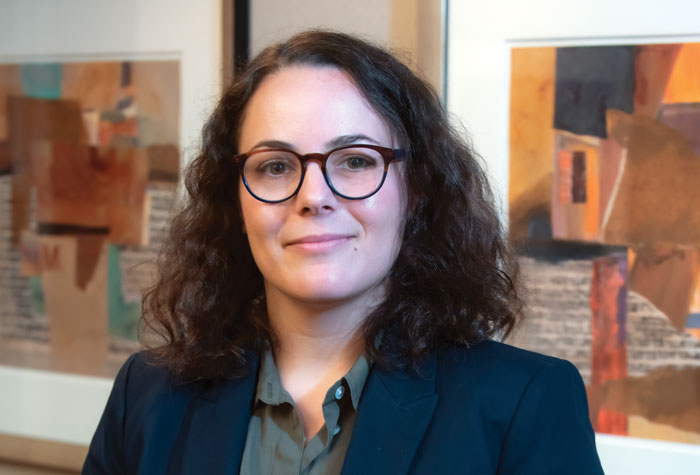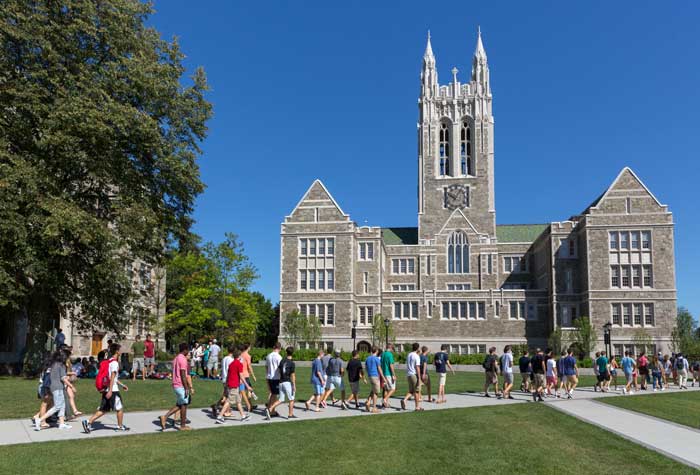
A participant in the 2014 Mod 500 tricycle relay around the Mod pathways.
Photo: Caitlin Cunningham
It's a Mod, Mod World
From backyard BBQs and matching Mod sweats to mud volleyball and the annual Modstock concerts, a look back at fifty years of everyone’s favorite temporary housing.
I’d never heard of the Mods until I arrived on the Boston College campus for orientation in the summer of 1994. “What’s up with these little houses?” I asked, as my classmates and I walked through lower campus. “That’s where the seniors live,” a fellow incoming freshman said. “That’s where you want to be.”
The prefab, two-story Mods (short for modular housing) were installed in 1970, and they’ve developed a certain mystique, both because they are somewhat exclusive—there’s room for only 438 seniors to live there, about a fifth of the class—and an epicenter of campus culture. Being a Mod resident carries with it a certain cachet. Sure, you get in through sheer luck, but the perception has always been that people who live in the Mods are part of a special club. As one friend used to say—without a whiff of hyperbole—“Everything happens in the Mods.”
So, despite the fact that they were small and dingy, there wasn’t a single person I knew who didn’t want to call one of the ruddy-brown huts home. You could score a Mod only by selecting five potential roommates and then hoping your number was drawn in the annual housing lottery. As the drawing rolled around during my senior year, I remember classmates saying little prayers, hoping divine intervention would deliver them into the Mods. When fate inevitably denied a space to the majority of us, there was heartache.
I recall a post-lotto conversation with one of my disappointed roommates. He was a legacy who’d basically grown up on campus, attending football, basketball, and hockey games. For Bryan, applying to BC was preordained, a no-brainer. And the way he saw it, Mod living was practically a birthright. “I always envisioned that that’s where I’d live,” he said. “I was devastated.”
Just how beloved are the Mods? In his 2002 Commencement address, the former NATO ambassador Nicholas Burns ’78 mentioned exactly one BC building: the Mod where he had lived (36A). After his speech, Burns made only a couple of stops on campus. One of them was a visit to 36A.
When the Mods opened, they were intended as temporary housing. Half a century later, it is difficult to imagine the Heights without them.
#ModMemories
What makes the Mods’ story doubly fascinating is their inauspicious beginning. In 1970, BC was facing a housing crisis. Earlier that year, the first women had matriculated, and the university was in the middle of a transformation from a predominantly commuter school to a residential one. There simply wasn’t enough housing on campus to accommodate the influx of new students. Plans to build a large dorm had fallen through, so administrators came up with a short-term solution: situate forty-three prefabricated modular duplexes on lower campus. Each duplex had two 1,100-square-foot units—A and B—with room for six seniors in each unit, plus patios and yards. They were supposed to be in place for only five years or so and then be razed to make way for new dorms.

Photos: Courtesy of The Heights
When installation day came in early September 1970, Jim Lewis ’72, MA’75, and his roommates were there. They were set to live in the very first unit. “We watched the crane lift Mod 1A off the flatbed and hover it about 20 feet over the pad,” said Lewis, who lives in Southborough, Massachusetts. “And then the chain broke. The Mod fell and smashed and splintered. Toilets were smashed, the doors were smashed.” Lewis was horrified at first. “And then we just started laughing, thinking it was the funniest thing we’d ever seen,” he said. (The Heights memorialized the mishap with a strip of photos in the September 15, 1970, issue.)
The Mods—including a new 1A—were gradually trucked onto campus, and though some students were able to move in at the end of October, a plumbers’ strike, bad weather, and faulty pipe fittings delayed full occupancy until December. While they waited, Lewis and everybody else who was supposed to reside in the Mods were instead shuttled to nearby hotels. (Two intrepid students, Bill Cagney ’72 and Tom Gibbons ’72, even pitched a tent behind Shaw House, according to The Heights.) Despite the initial hiccups, the Mods proved a fast success. “They had living rooms, kitchens, separate bedrooms. They were appealing because they were little apartments,” said Professor James O’Toole ’72, the Clough Millennium Chair of History and the author of a forthcoming history of Boston College. “The primary alternative were two-person cells on upper campus.”
Even as new dorms with modern conveniences sprung up, seniors continued to opt for the cramped spaces with the paper-thin walls. “You could talk through them,” Lewis recalled. “You could have entire conversations with the people in the Mod next door.”
From the very beginning, the Mods were the on-campus party scene. Since they were mostly occupied by seniors living in close proximity (an occasional junior would slip into the mix), and since BC lacked a Greek system, each building became a mini fraternity or sorority. “We had a lot of theme parties,” said Lewis, who recalls stocking the fridge with white Liebfraumilch wine for one German bash.
BC students aren’t the only ones who partake in the festivities, either. Tell an alum from another New England university that you went to BC, and they’re likely to respond, “I partied in the Mods once.” There have even been celebrity revelers. My sophomore year, Adam Sandler did a show at Conte Forum. After his set, he hopped into a limo and made his way to Mary Ann’s, where one of the seniors persuaded him to come back to campus. Sandler’s driver took him to Mod 23B, where the comedian played pool and drank beers until the wee hours. As a sophomore, I wasn’t frequenting Mod parties—but this one I could’ve attended. One of my roommates’ cousins lived in 23B, and I remember the sinking feeling when I found out I’d missed my chance to throw a few back with Opera Man.

Each year, students vote on a slogan for the official Mod sweatshirts. Clockwise from left, former Mod 6A residents Sarah Marchese ’20, Kaelin Bush ’20, and Natalie Hoy ’20 show off last year's version, which proclaimed: “The Mods: Permanently Temporary Since 1971.” (When the duplexes opened in 1970, the Class of 1971 were the first seniors to live in them.)
Photo: Peter Julian
But the parties, of course, are only a small part of what makes the Mods special. The communal spirit is evident in events like the Mod 500, a costumed, fundraising tricycle race around the Mod pathways, and Modstock, an annual spring concert that’s attracted well-known performers such as Ludacris, T-Pain, Guster, and Macklemore. Each year, inhabitants vote on the slogan that will emblazon Mod sweatshirts. And, oh, the patios. Nothing made me more envious of Mod dwellers than the scent of burgers wafting through lower campus on warm spring days as the residents sprawled in beach chairs or tossed footballs in their yards.
Then there was the winter when students flooded the courtyard between Mods to create a skating rink. And the friends who lived in adjacent A and B units and cut a hole in the downstairs wall, turning the units into one big twelve-person pad. Ryan Robinson ’99 and his roommates, meanwhile, found an even more creative way to alter Mod 6A. “We tossed around the idea of either painting the Alumni Stadium football field or Conte Forum on the downstairs ceiling,” Robinson recalled. “We ended up going with the hockey rink. We went to Conte and took a look at it and got some information about the dimensions of the circles and the line placement. There was some math involved. Half of my roommates were computer science guys so they were into that.” It took three weeks to complete the Kelley Rink mural—“The worst part was watching them paint it over when we moved out,” Robinson said.
Modstock Through the Years
Modstock—the annual spring concert held in the Mod Lot—is a relatively recent tradition. Here are just a few of the big-name artists who’ve helped students celebrate the end of classes over the years (remember Sugar Ray?).

FROM LEFT: Guster in 2005, Big Boi in 2009, Sugar Ray in 2011, Macklemore in 2013, T-Pain in 2016, Chelsea Cutler in 2019. Photos: (from left) Alamy; Terje Dokken; Andy Martin Jr./Zuma; Ricky Fitchett/Zuma; Alamy; Thomas Rasmussen/Gonzales Photo
Fresh paint isn’t all the Mods get after a senior class departs. They’re constantly upgraded with new cabinets, new appliances, and new carpets. “We put a lot of effort into these units,” said Jamie MacDonald, the construction project manager at BC. “We know how loved they are.”
Still, new, more space-efficient buildings and construction have encroached on the enclave over the years, reducing the total number of units from 86 to 76. After the University announced it would eliminate six units in 1992 to make room for Corcoran Commons and Vanderslice Hall, seniors inundated the president’s office with letters and phone calls, contacted local media, and organized an all-night sit-in near the ill-fated dwellings. Though their efforts didn’t prevent demolition, they did delay it until after Commencement that year. Four additional units were removed in the early 2000s.
It seems that everyone’s favorite temporary houses are safe for now: “There are no plans in the immediate future for removing the Mods,” said Greg Jones, director of housing operations. But if the Mods eventually do meet the wrecking ball, it will be a shame. Though I missed out on living in one, I spent lots of 1998 in their tight confines. If I close my eyes, I can still smell the stale beer and hear the bad late-’90s music turned up loud enough to shake the stuffed, sweaty building. And I can’t imagine BC without that. ◽


 print
print mail
mail











